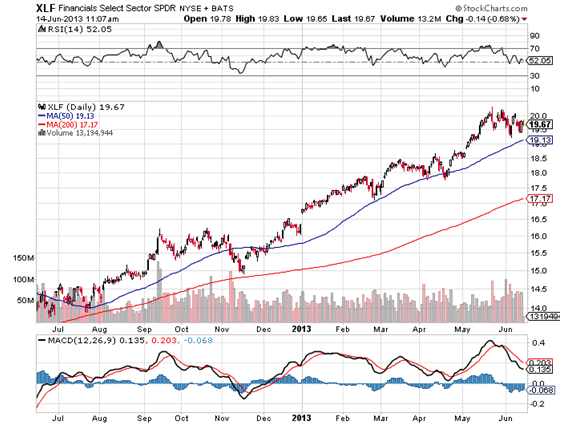U.S. Mortgage Interest Rates on the Rise; Repeat of Lead-Up to 2008?
Housing-Market / Mortgages Jun 18, 2013 - 04:30 PM GMT Sasha Cekerevac writes:One reaction that should not surprise long-term investors is that the market will move far quicker and further than most people expect. Even before the Federal Reserve has made any statement regarding the timing of reducing its asset purchase program, investors have already begun selling their fixed-income investments, which is causing yields to rise.
Sasha Cekerevac writes:One reaction that should not surprise long-term investors is that the market will move far quicker and further than most people expect. Even before the Federal Reserve has made any statement regarding the timing of reducing its asset purchase program, investors have already begun selling their fixed-income investments, which is causing yields to rise.
This is now resulting in higher mortgage rates.
According to the Mortgage Bankers Association, the average for 30-year mortgage rates increased to 4.15% last week, a substantial move from May’s average for 30-year mortgage rates, which was approximately 3.59%. (Source: “Mortgage Rates on Six Week Streak Higher,” Wall Street Journal, June 13, 2013, accessed June 14, 2013.)
Even though long-term mortgage rates at 4.15% are still near historically low levels, this has impacted refinancing, which will in turn affect certain bank stocks that have benefited from the boom of lower mortgage rates.
The Mortgage Bankers Association also reported that applications for mortgage refinancing are down 36% since the beginning of May. This is a direct result of higher mortgage rates.
Many bank stocks have benefited from refinancing revenue brought on through lower mortgage rates. This revenue generation appears to be in jeopardy, at least resulting in lower revenue growth rates, since fewer homeowners will refinance as mortgage rates continue to rise.
However, the positive sloping yield curve is a benefit for bank stocks, as they make the spread between paying short-term rates and lending at long-term rates. The greater the spread, the larger the possibility of profits.
The question regarding bank stocks is: will new lending be large enough to compensate for the decline in refinancing caused by higher mortgage rates?
That’s a difficult question to answer; however, another way to look at the situation is to instead consider this question: what is the current value of bank stocks, and how much future revenue is the market pricing in?
As we all know, bank stocks have made some tremendously strong moves over the past few months, as shown in the chart of the financial sector below. Many of these moves have been fundamentally driven, as both revenues and earnings have grown substantially.
However, as mortgage rates have begun rising, bank stocks now face headwinds from a very large business segment—that of refinancing. Considering the move up in the price of most bank stocks, I would certainly be cautious in forecasting the level of revenue growth as mortgage rates make their upward adjustment.

Chart courtesy of www.StockCharts.com
While bank stocks might generate new business, several have refinancing as a large share of their mortgage business. Just a couple of bank stocks that I would be worried about due to the share of mortgage refinancing are Bank of America Corporation (NYSE/BAC) and Citigroup Inc. (NYSE/C).
Over the next few years, I believe mortgage rates are set to continue rising higher, and this will put significant pressure on many business segments for bank stocks. Considering the strong performance for most bank stocks, I think that it would be prudent to consider taking profits and reducing exposure in one’s portfolio to this sector.
By Sasha Cekerevac, BA
www.investmentcontrarians.com
Investment Contrarians is our daily financial e-letter dedicated to helping investors make money by going against the “herd mentality.”
About Author: Sasha Cekerevac, BA Economics with Finance specialization, is a Senior Editor at Lombardi Financial. He worked for CIBC World Markets for several years before moving to a top hedge fund, with assets under management of over $1.0 billion. He has comprehensive knowledge of institutional money flow; how the big funds analyze and execute their trades in the market. With a thorough understanding of both fundamental and technical subjects, Sasha offers a roadmap into how the markets really function and what to look for as an investor. His newsletters provide an experienced perspective on what the big funds are planning and how you can profit from it. He is the editor of several of Lombardi’s popular financial newsletters, including Payload Stocks and Pump & Dump Alert. See Sasha Cekerevac Article Archives
Copyright © 2013 Investment Contrarians - All Rights Reserved Disclaimer: The above is a matter of opinion provided for general information purposes only and is not intended as investment advice. Information and analysis above are derived from sources and utilising methods believed to be reliable, but we cannot accept responsibility for any losses you may incur as a result of this analysis. Individuals should consult with their personal financial advisors.
Investment Contrarians Archive |
© 2005-2022 http://www.MarketOracle.co.uk - The Market Oracle is a FREE Daily Financial Markets Analysis & Forecasting online publication.



